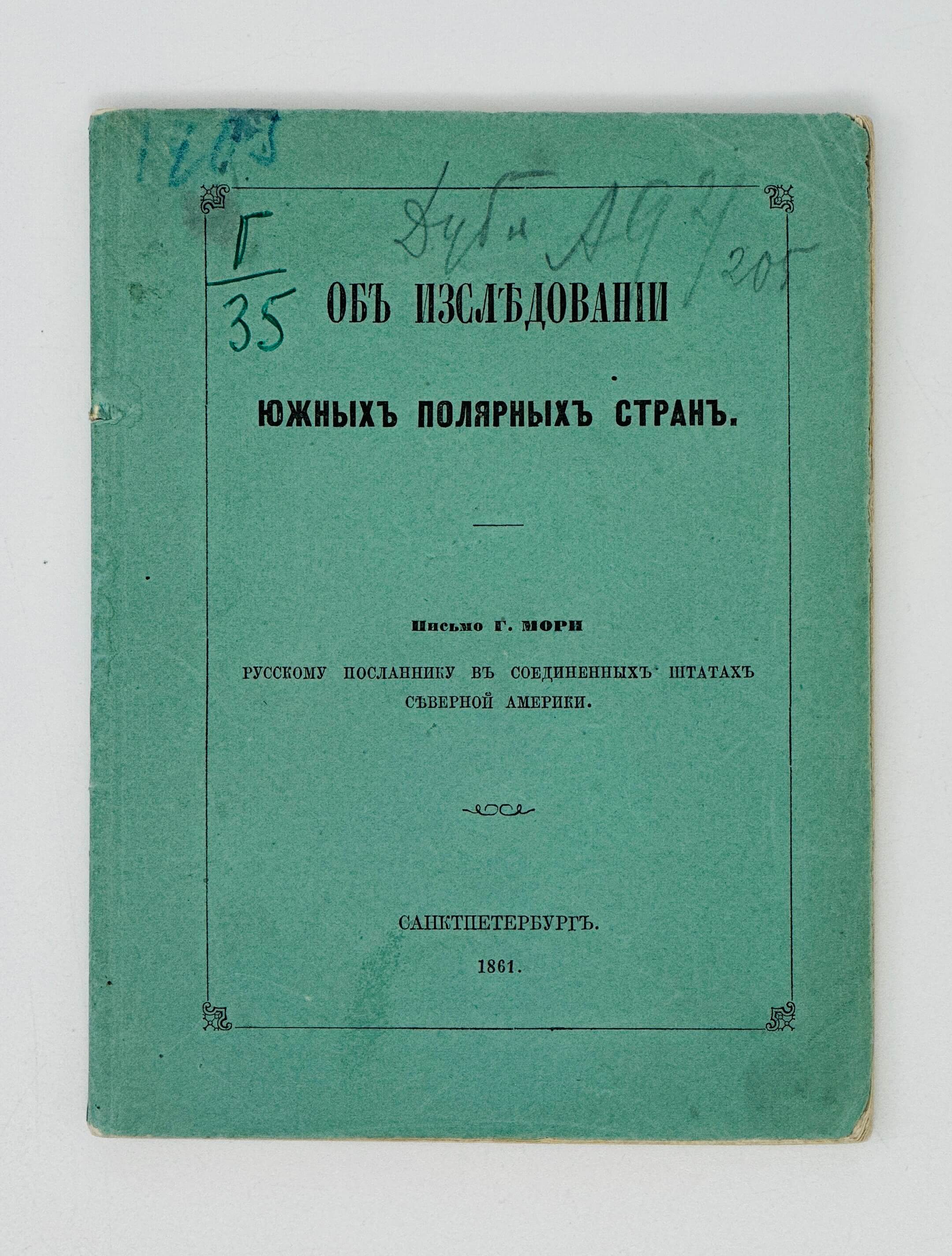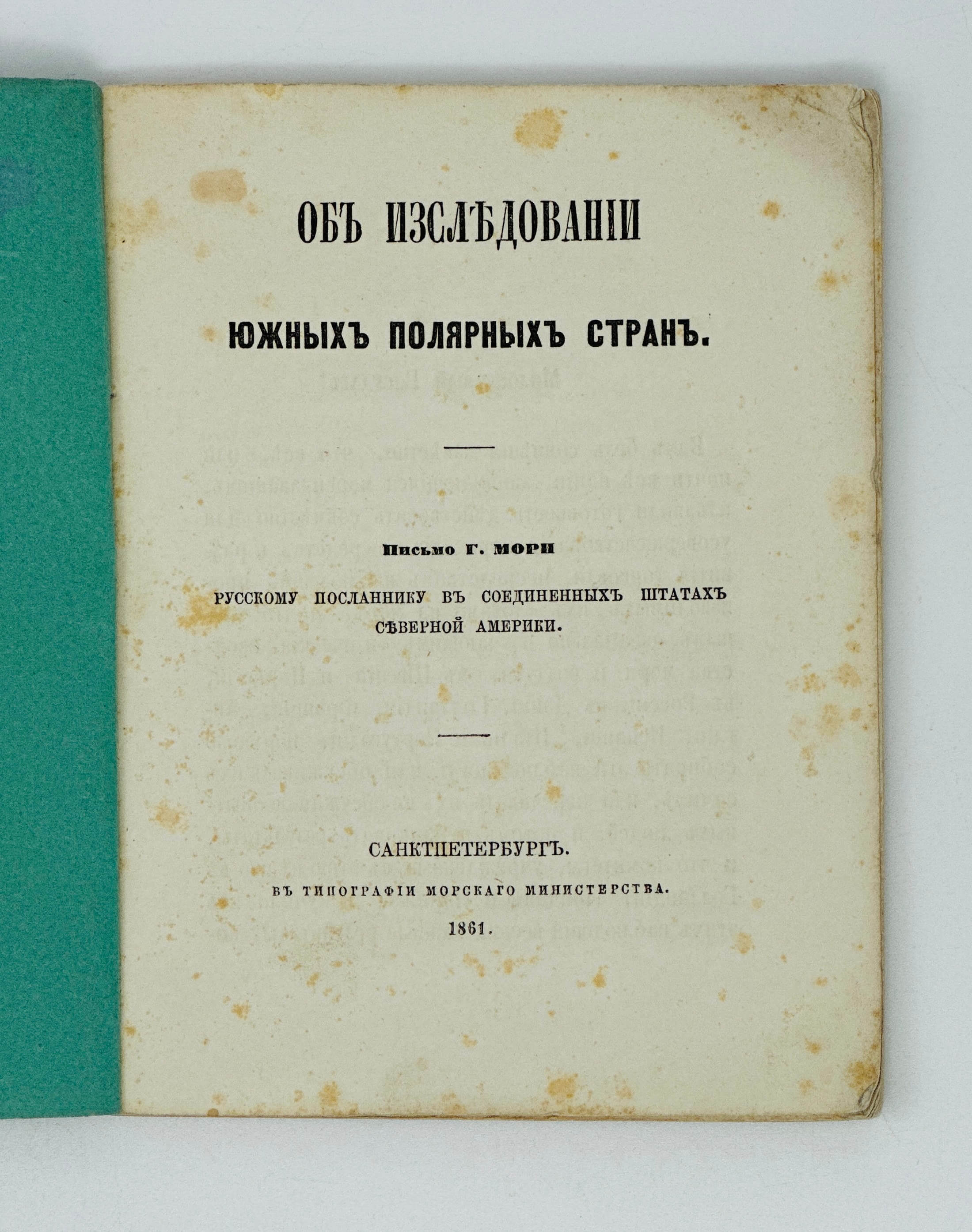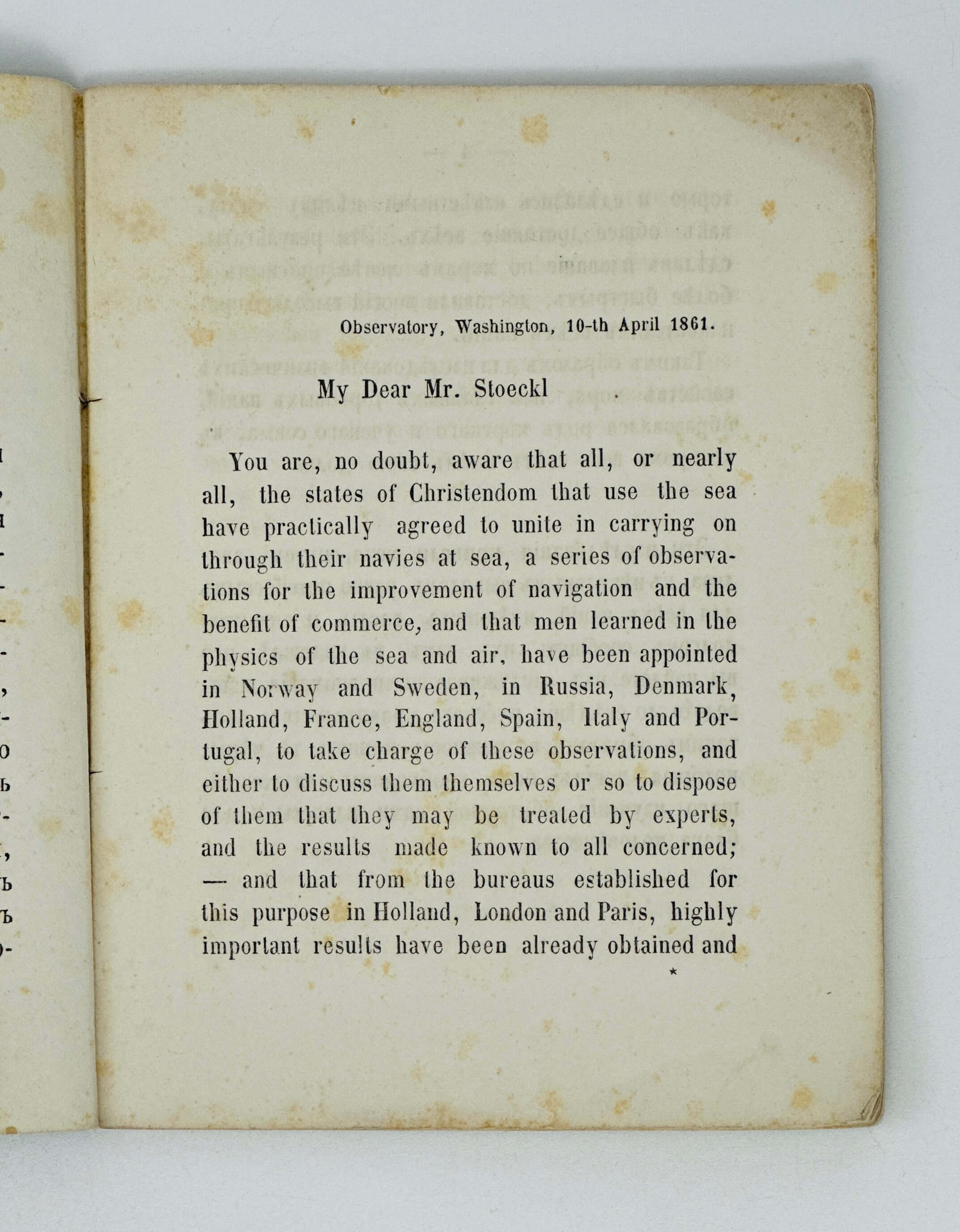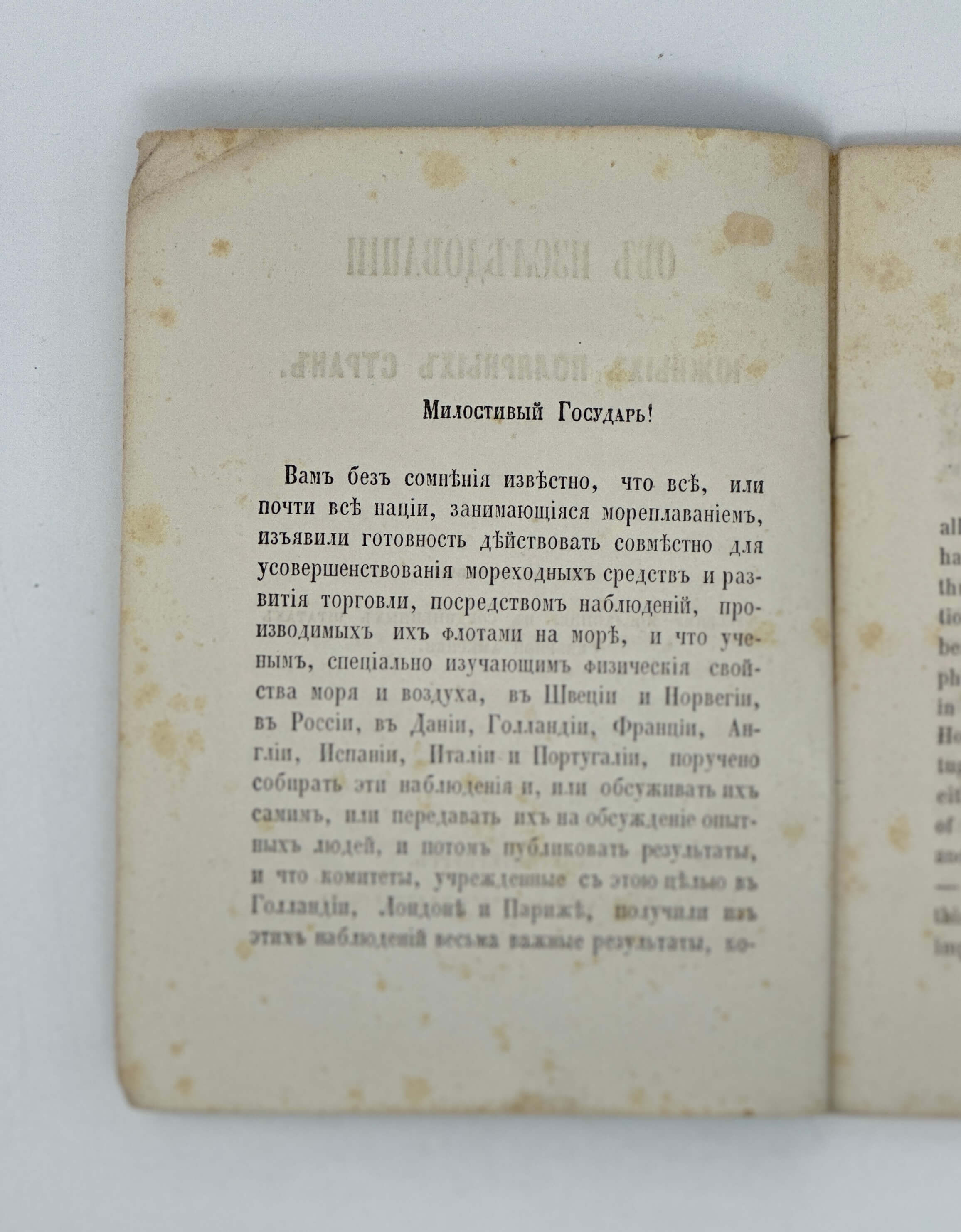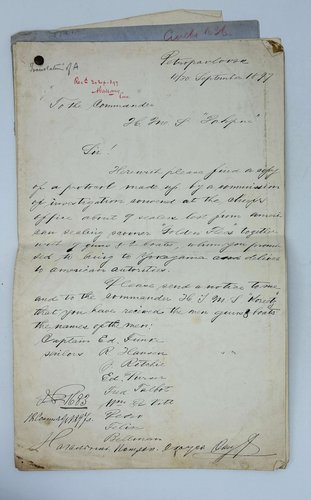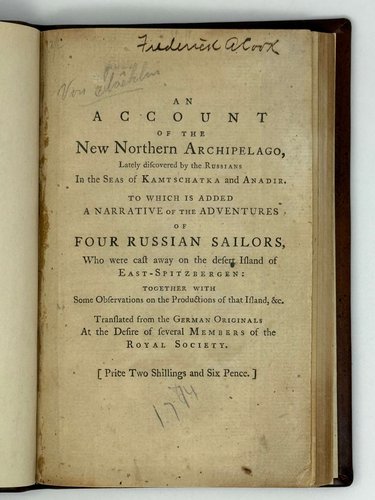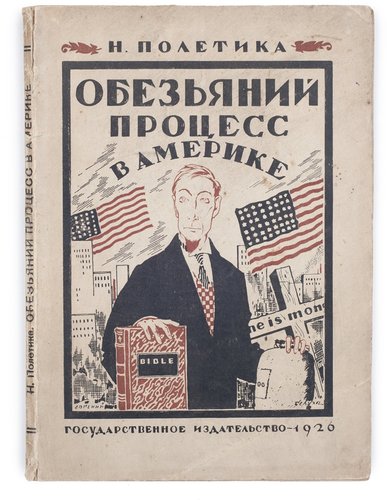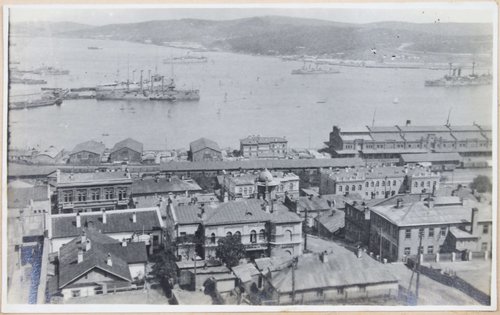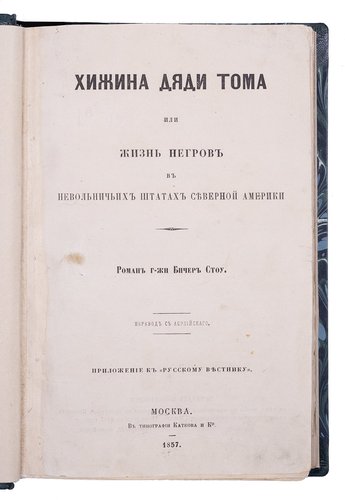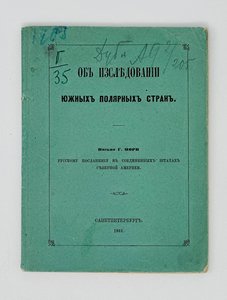
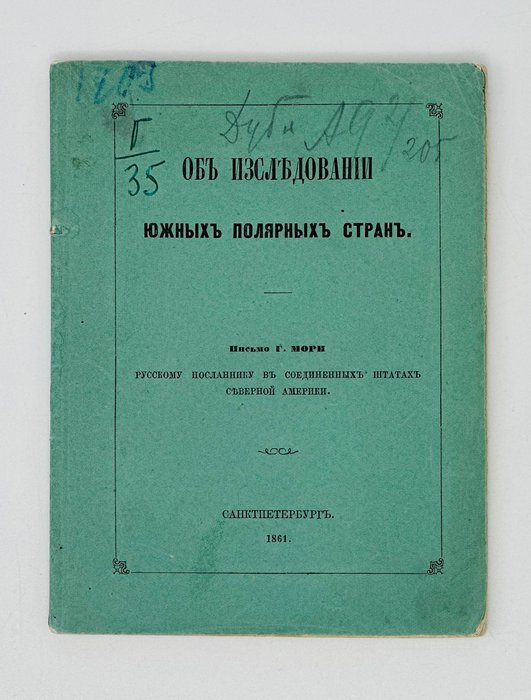
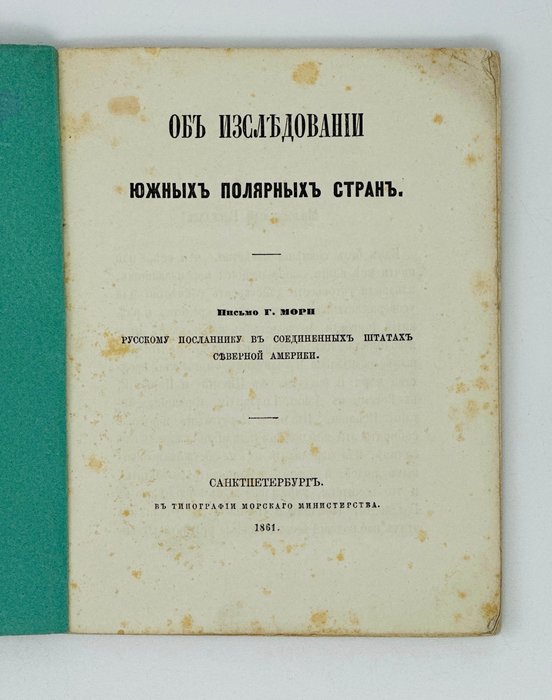
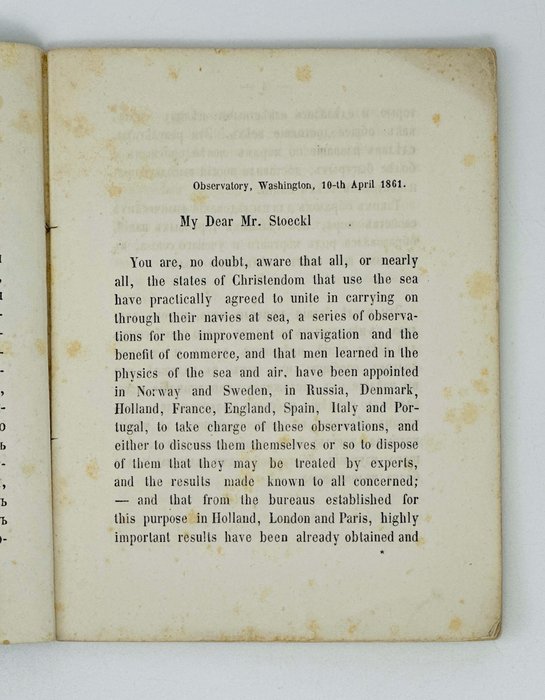
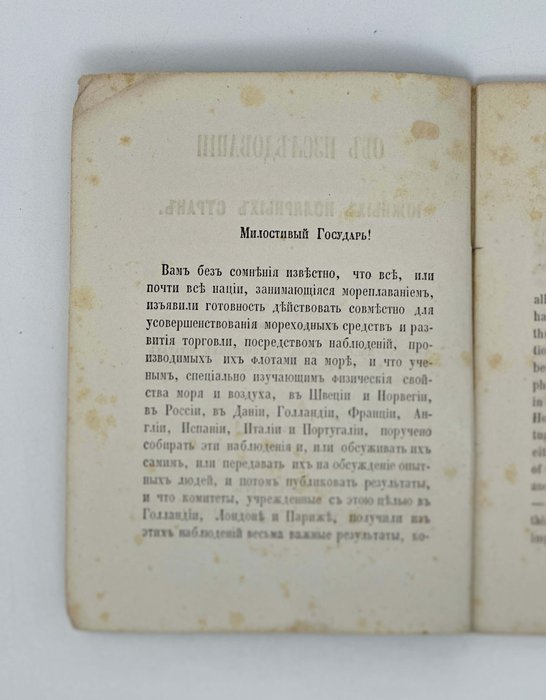
#RA61
1861
First and only edition. Octavo. 63, [1] pp. Text parallel in Russian and English. Original publisher’s wrappers. Front wrapper with pencil and ink library numbers, paper slightly age-toned and with occasional foxing, but overall a very good copy.
Very rare Russian imprint with no paper copies found in Worldcat (only two microforms in the Library of Congress and New York Public Library).
Rare little-known piece of early Russian Antarctic literature. A parallel Russian-English publication of a letter, written by a famous American oceanographer and naval officer, “Pathfinder of the Seas,” Matthew Fontaine Maury and issued by the Russian Imperial Naval Ministry – evidently in a limited number of copies. The letter was addressed to “My dear Mr. Stoeckl” – Eduard Guillaume Baron de Stoeckl (1804-1892), then the Ambassador of the Russian Empire to the United States (in office: 1855-1869), who later became known for his negotiation of the sale of Alaska (1867). The brochure was never republished.
Dated “Observatory, Washington, 10th April 1861” (just two days before the beginning of the American Civil War), the letter appeals to Stoeckl as a representative of the Russian Empire to take part in the organization of a joint exploratory expedition to the Antarctic, to “unbar the gates of the South” (p. 59). This was “the first ever proposal for international cooperation in polar research. Maury’s initiative also prompted the first ever international correspondence about polar cooperation, fourteen years before Carl Weyprecht launched his better known proposal” (Bulkeley, R. ‘To unbar the gates of the South’: Maury’s 1860-1861 proposals for Antarctic cooperation// Polar Record: A Journal of Arctic and Antarctic Research, vol. 47, issue 4, October 2011, pp. 310-326).
Having based on the results of his two-decade analysis of data on the sea weather, winds and currents provided by numerous American and international naval and merchant ships (the publications based on this data made Maury famous and earned him the title of the “father of modern oceanography”), Maury came up with a theory that “the Antarctic winter is by no means as severe as that of the Arctic <…> No explorer has yet tried the Antarctic winter. There is, my investigations lead me to believe, no great difference between it and the Antarctic summer, and the erroneous impression that has fastened itself upon the public mind as to the extreme severity of winter about the South Pole has no doubt its root in the low summer temperatures that prevail there” (Maury, M. Ob issledovanii yuzhnykh polyarnykh stran, p. 7, 52). Maury based his conclusions on the presumption that the winds blowing to the Arctic Ocean are continental and consequently dry. In contrast, the winds entering the Antarctic region are maritime and consequently full of moisture, which makes the Antarctic climate like that of Ireland (mild, with similar temperatures in summer and winter) in comparison with cold and dry climate of Labrador.
The brochure contains a detailed description of Maury’s theory, followed by his remarks on the Antarctic discoveries of James Cook (South Georgia and the South Sandwich Islands; see: Ob issledovanii…, pp. 48-52). The last part of the letter describes a project of a future international expedition, which could achieve better results due to the invention of steam navigation and the development in Australia of “one of the most extensive shipping ports of the world” (i.e. Melbourne; see: Ob issledovanii, p. 55). Maury suggested surveying the Antarctic waters to establish sheltered settlements that would serve as expedition base camps. The joint expedition with responsibilities divided between several participating nations should, in his opinion lower the costs to be “almost nothing” and promote the honest contest between “the officers and men under each flag” (Ob issledovanii…, p. 63).
The letter to Eduard de Stoeckl was forwarded to Grand Duke Konstantin Nikolayevich (1827-1892), then General Admiral of the Russian Imperial Navy with the powers of a Minister. The Grand Duke ordered to publish the letter in Russian and English and forward it to prominent Russian scientists and naval officers to get their opinions on Maury’s project. Among the recipients of the brochure were Ferdinand von Wrangel, Friedrich von Luetke, Pyotr Anjou, Gennady Nevelskoy, Paul von Krusenstern, Emil Lenz, Otto von Struve, Leopold von Schrenck, and others. The feedback did not support the project, and Konstantin Nikolayevich didn’t give it a green light in Russia. Nevertheless, he remained very fond of Maury, who had supplied the Russian Naval Ministry with his books and maps since the 1850s, and even invited Maury to live in Russia and become the chief astronomer of the Russian Navy after the latter had left his service in the National Observatory in Washington due to the beginning of the American Civil War. Maury respectfully declined the offer but remained in contact with the Russian Naval Ministry throughout the 1860s (see more: Smirnov, V.G. Ot kart vetrov i techenii to podvodnykh min: Neizvestnye stranitsy rossiisko-amerikanskikh naychnykh I voyennykh kontaktov v seredine XIX veka [From maps of winds and currents to underwater bombs: Unknown pages from the history of Russian-American scientific and naval contacts in the mid 19th century]. SPb., 2005).
As we now know, Maury’s project was based on erroneous assumptions about the mildness of the Antarctic winter. It also didn't receive approval from the British and French scientific communities (see Bulkeley, Ibid.). Nevertheless, in the early 1880s, the letter to Eduard de Stoeckl was studied by the members of the Russian Geographical Society in the process of organization of magnetic and meteorological observations during the First International Polar Year (1882-1883) (Smirnov, p. 114). Maury’s idea of international cooperation in the Antarctic exploration evidently outpaced its time but became a prediction of the principles of modern-day work on the continent.
Overall a rare, interesting piece of Antarctic literature with an interesting connection to Russo-American scientific relations in the 19th century.

